Michelle Scott's Blog, page 30
February 1, 2011
How is the Universe Like a Deck of Cards?

Question: How is the universe like a deck of cards?
Answer: Both can be shuffled.
In a recent interview on NPR's show Fresh Air, physicist Brian Greene says, "...if you shuffle [a deck of cards], there's just so many orderings that can happen... If you shuffle that deck enough times, the orders will have to repeat. Similarly, with an infinite universe and only a finite number of complexions of matter, the way in which matter arranges itself has to repeat."
So, according to this, right now I am sitting at my desk watching my neighbor across the street shovel his driveway. And at the same time, I am sitting on a tropical beach with a strawberry daiquiri. (Although, I have to wonder how I got stuck with the snow...) So which reality is the real one? Well, the problem is that each person in each reality thinks that hers is the genuine thing.
Dr. Greene's hypotheses are fascinating and, according to him, not part of fringe thinking, but ideas that are becoming more accepted by the scientific community. Just like Copernicus shook up the world by stating that the earth is not the center of the universe, so too, Greene believes that the multiverse hypothesis will shake up our notions of our universe being the only universe.
But for me, anyway, knowing that there are other universes out there is interesting. But I'd like to be able to find my way to that tropical beach and strawberry daiquiri.
If you're interested in learning more on this topic, you can read an excerpt of Greene's book, The Hidden Realty .
Also, here's the fascinating NPR interview with Dr. Greene. (NOTE: if you don't see the interview, you can click on the back arrow until it appears.)
_________________________
Photo credit: allison m10
January 28, 2011
Creepiest Plants on the Planet
 Thanks to a FaceBook friend who alerted me to this wonderfully eerie article on cracked.com. , I can share this list of the ten creepiest plants on our planet. And, trust me, they are creepy. I've pictured my favorite one here. It's name alone is a marvelous horror: Bleeding Tooth Fungus (and, no, I am not making this up.)
Thanks to a FaceBook friend who alerted me to this wonderfully eerie article on cracked.com. , I can share this list of the ten creepiest plants on our planet. And, trust me, they are creepy. I've pictured my favorite one here. It's name alone is a marvelous horror: Bleeding Tooth Fungus (and, no, I am not making this up.)But if you really wanted to be creeped out, check the Chinese Fleece Flower. If I dug up something that looked like that, I swear I'd find myself a priest and get an exorcism started.
January 27, 2011
Blood Sisters Review on Book Pumper

I'm so thrilled that my Kindle book, Blood Sisters, just received an amazing review at BookPumper. Thanks, Paul!
January 20, 2011
Two Blogs
Today, I was invited by the amazing Skyla Dawn Cameron to be the guest blogger on her site.
Also, I've reviewed a post-apocalyptic zombie novel, Motor City Shambler, over at Cheap Thrills.
Enjoy!
January 18, 2011
The World as Teens See It?
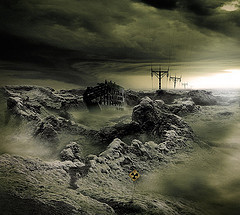
I didn't read my first dystopian novel until I was a junior in high school. After that, I couldn't get enough.
Call me emo, but I fell in love with novels in which society attempts to crush the spirits of anyone who dares to defy it. My first exposure was George Orwell's famous 1984 followed by Brave New World, The House of Stairs and Lord of the Flies. Each time I closed one of those books, I walked away depressed but thoughtful. More critical of the world around me.
Lately, dystopian YA fiction is all the rage. For Christmas, my daughter received a copy of one of the most popular ones: The Hunger Games (a book I'm eager to read myself). Every time I ask her how it is, she says, "It's so sad!" But it has made my twelve-year-old non-reader want to read more.
So what is it about these kinds of bleak novels that so appeal to teens? Patrick Henry, Bass, editor for Essence Magazine, said in a recent interview on NPR's The Takeaway, that he believes it is the appeal of the hero theme. "Young people in dystopian fiction," says Bass, "tend to take control, and they are heroes who actually do find some glimmer of hope in some way."
I suppose that these novels are like post-apocalyptic zombie movies. They make the reader/viewer ask herself, "What would I do?" Having a hero to identify with supplies the teens with a role model. Someone that can guide them when making decisions on their own.
Then again, the appeal simply might be because there is no one as self-obsessed as a teenager who thinks she's a victim. After all, what 13 - 16 year old doesn't feel like its him against the entire world?
_________
Photo credit: EXP Belio: 031 - Dystopia
January 7, 2011
And Now Your Moment of Zen...
For those of you who don't know it, I am an adjunct English professor at a small community college, and the following video went straight to my heart.
January 6, 2011
The Mutable Past
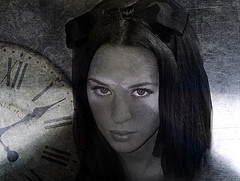
It's ridiculously obvious that what we do in the present affects what happens in the future. If, for example, I don't bother to study for a test, I will probably fail it. But what seems to becoming a more and more acceptable idea is that what I will do in the future has an impact on what I am doing right now. So, for example, if I study for that test after I take it, I may end up with a higher grade.
Sound impossible? Well, Cornell psychology professor Darrel Bem thinks that he has proven that very idea.
The future, Bem says, impacts our present, somehow leaking into it and giving us clues on how to behave. In one experiment Bem conducted, students studied for a test after taking it. And, amazingly, their scores improved. In fact, he was able to improve the student's scores. In another experiment in precognition, he improved subject scores by 3.1% (as opposed to 50%, which would have been the number if the subjects had been randomly guessing at the answers.)
Although a 3.1% increase in probability may not seem like a huge leap, Psychology Today blogger, Melissa Burkley points out that, "although that is fairly small, it is as large as or larger than some well-established effects, including the link between aspirin and heart attack prevention, calcium intake and bone mass, second hand smoke and lung cancer, and condom use and HIV prevention (Bushman & Anderson, 2001)."
The hypothesis that our future impacts our present may sound crazy, but renown physicist Stephen Hawking agrees in part with Bem. In his book, The Grand Design, Hawking also suggests that the future impacts the present. He bases his idea on the idea that particles moving through space don't take a 'single, definite path' to their destinations, but rather 'take every path and they take them all simultaneously.' (Hawking 75) What this means is that the particles, because they take every path, somehow collect information along the way that allows them to make certain decisions on where to ultimately arrive. Hawking states, "The universe, according to quantum physics, has no single past, or history." Instead of being set in stone, the past is more like a continuum of possibilities.
Finally, religion enters into this strange mix by way of English theologian, C. S. Lewis, who claimed that prayer can actually work retroactively, provided that the person praying does not know the outcome. For example, if someone you know is having a medical procedure at 2:00 p.m., but you don't remember to pray for her until 3:00 p.m., your prayer can still have an effect on that person's surgery provided that you don't already know the results. Lewis' logic behind this claim is that any deity who exists outside of time would have the power to change events in the past. (Lewis, On Special Providences)
While the idea of the future affecting the present is fascinating, I myself have a hard time believing it. But then again, I am practical enough to want to cover all of her bases. So if you'll excuse me, I'm going to go study for a test I took yesterday.
_______
Photo credit: Time, by Alice Popkorn
December 15, 2010
An Anthem for the Battle Lands
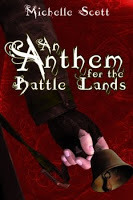 I'm so thrilled to have my next book out before the year's end!
I'm so thrilled to have my next book out before the year's end!Desperate to maintain their superiority, Magicians are fighting to keep machinery and inventions out of the hands of their serving class, the commons. To this end, the Magicians have waged a war - a terribly destructive, magical war - against any and all who dare to allow the unmagical commons to improve their lives through mechanical means.
In the midst of this battle, a small group of commons struggles to survive. They make their living by serving the dead, charging five cents to dig a grave, sew a shroud, and ring a peal. And in a land decimated by war, plague, and famine, they have plenty of work.When the group meets a charismatic man by the name of William Rufflit and learns that he is working to build a militia of commons armed with his terrifying new invention - the fyrestick - they feel something they haven't experienced in a long time: hope. But what they don't realize is that Rufflit may not be their savior after all. He may, in fact, be an enemy even more fearsome than the one they are already facing.
December 9, 2010
Five Scenes I'll Never Forget (but Wish I Could...)
My Top Five Unforgettable Scenes
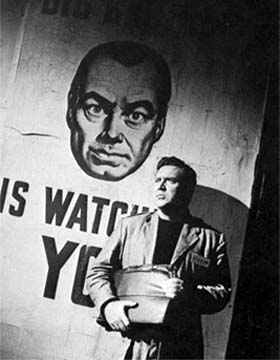
5. 1984
In addition to all of the horrors of the novel, there's a scene in which the main character, Winston Smith, is in front of his TV participating in the mandatory calisthenics. But since the TV also allows people to watch him, he gets reprimanded when he slacks off. Now, the reason this troubles me is because of the Wii Fit 'game' I bought my family last year. Whenever the annoying avatar yells at me for either gaining weight or not regularly exercising, I think of 1984. And when the Wii avatar tries to get me to rat out the other members of my family by asking why they haven't been working out, I think of Big Brother.
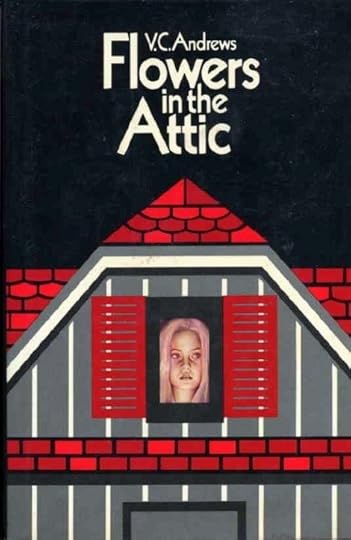
4. Flowers in the Attic
If you were a girl growing up in the late seventies or early eighties, chances are that you read this book. And if you read this book, would you ever be able to forget the scene between Chris and Cathy Dollanger? No, I didn't think so.
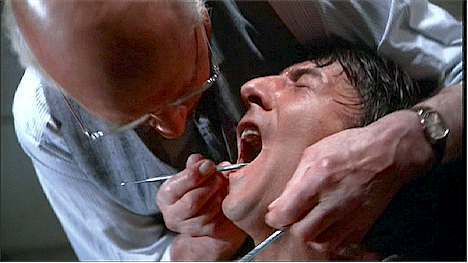
3. The Marathon Man
Whether you read the book by William Goldman or see the movie with

2. The Exorcist
I didn't actually see this movie when it came out since I was only nine-years-old, but I did see the commercials for it. I used to lay awake terrified that my bed would start shaking. And, years later, when I finally did see the movie, I swore I'd never eat pea soup again after watching young And the number one scene I'll never be able to get out of my head...
[image error]
1. Firestarter
Right now, there's a bone lodged in my garbage disposal, but neither my husband nor I will dig it out because of that scene in Firestarter. So the bone continues to grind away. But I'll tell you right now that I'd rather buy a new garbage disposal than stick my hand in there.
October 6, 2010
Schadenfreude
 I'm psyched! My short story, Schadenfreude, is now out on Orson Scott Card's Intergalactic Medicine Show e-zine. Not only did Scott Altman give me a wonderful illustration to go with the story, but this is also my first 'professional' sale.
I'm psyched! My short story, Schadenfreude, is now out on Orson Scott Card's Intergalactic Medicine Show e-zine. Not only did Scott Altman give me a wonderful illustration to go with the story, but this is also my first 'professional' sale.Stop by and check it out!



